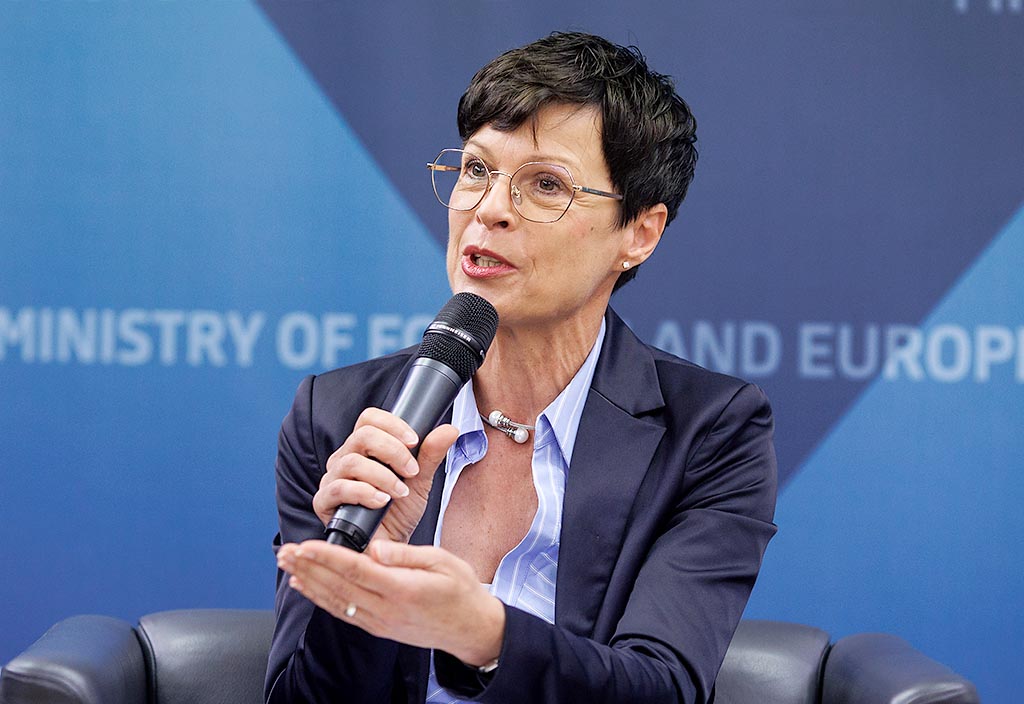By: Tanja Brkić / Nova24tv
Draghi’s reforms are largely tailored to benefit multinationals and globalism, while being directed against the sovereignty of individual states, without addressing the real problems facing the EU, according to economist Štefan Šumah. In addition to commenting on the reforms, he also weighed in on the confusion surrounding the nomination of Marta Kos for the position of EU Commissioner, stating that if she is elected, the EU Commissioner will benefit Switzerland, not Slovenia.
Šumah likened the situation surrounding the selection of the Slovenian EU Commissioner to the 1950s and 1960s, when high-ranking directors of United Fruit Company would step in to manage affairs in “independent” South American countries, while the local government servilely fulfilled their every wish.
Šumah admitted that he is not well-versed in Draghi’s full report, which spans over 400 pages. However, based on foreign articles, he interprets it as “a politically correct set of wishful thoughts, aimed at pleasing both EU citizens and major competitors like the U.S. and China.” While he agrees with parts of Draghi’s reforms, “such as reducing bureaucracy and improving decision-making (but not at the expense of member states’ sovereignty) and reducing dependence on non-EU suppliers in key industrial areas,” he views “the green transition as an obstacle preventing the EU from maintaining competitiveness.”
As reported, Mario Draghi presented a grim outlook for Europe’s future, asserting that improvement in current conditions is unlikely. He noted that while Europe is shrinking, the U.S. and China are gaining dominance. Draghi pointed out that the leading companies in research and investment remain the same as they were 20 years ago – mostly in the automotive industry – while the U.S. and China are advancing in the digital sector. China is even surpassing Europe in areas like electric vehicle manufacturing.
The EU faces several challenges, including weak financial markets, expensive energy, and fragmented research and development efforts. Draghi’s vision for addressing these issues focuses on clean energy, high technology, and resilience. He also proposes energy market reforms, relaxing merger rules, and changing EU legislative procedures.
Šumah believes that EU countries will inevitably need to increase military spending and prioritise innovation and development, including digitalisation. “However, rigid adherence to the green agenda and decarbonisation (despite the fact that EU countries are already the world’s smallest polluters) will only stifle development and raise energy costs, further hindering the EU’s competitiveness with China and the U.S. I would like to protect the European market, jobs, and social achievements, without resorting to protectionism. Debt? Again, it is only beneficial to banks and funds,” Šumah adds.
Draghi’s programme fails to address the real problems of the EU
According to Šumah, the programme mainly benefits multinationals and globalism while undermining the sovereignty of EU member states. He warns that it does not solve the EU’s problems, nor does it even address key issues such as migration, low birth rates (which directly impact the economy), competitiveness hampered by high energy costs, wasteful spending on unproductive activities, and irrational EU bureaucratic regulations.
The confusion surrounding the EU commissioner selection
Regarding the recent events surrounding the selection of the Slovenian EU Commissioner, Šumah commented that “Ursula von der Leyen reminds him of high-ranking directors of United Fruit Company from the 1950s and 1960s, who would come to impose order in a ‘independent’ banana republic of South America, with the ‘independent’ prime minister grovelling before them and servilely fulfilling his every wish.”
Whom would a Swiss tax resident represent?
As is well known, Marta Kos is a Swiss tax resident and does not pay taxes in Slovenia, raising questions about her ties to the country. Žiga Turk pointed out that Kos did not attempt to transform Slovenia into Switzerland, but instead chose Switzerland as her home. This raises the question of whether someone who is not a tax resident and has no direct interests in Slovenia can adequately represent Slovenian interests as an EU Commissioner. Another dilemma is whether Kos, if she becomes a commissioner, will pay taxes in Slovenia or continue to do so in Switzerland. The left-wing has often been critical of athletes who change their tax residency, yet Kos’ situation appears to be receiving little scrutiny.
Regarding tax residency, Šumah notes that it is a personal choice, “ultimately, a matter of profit optimisation. Tax residency is often a stronger bond with the country of residence than citizenship itself, as a person’s entire focus (economic interests, tax payments, daily life, education) shifts with it. Citizenship is just a formality; residency is the substance. So, in the end, Switzerland will get an EU Commissioner (if Ms. Kos is confirmed).”

